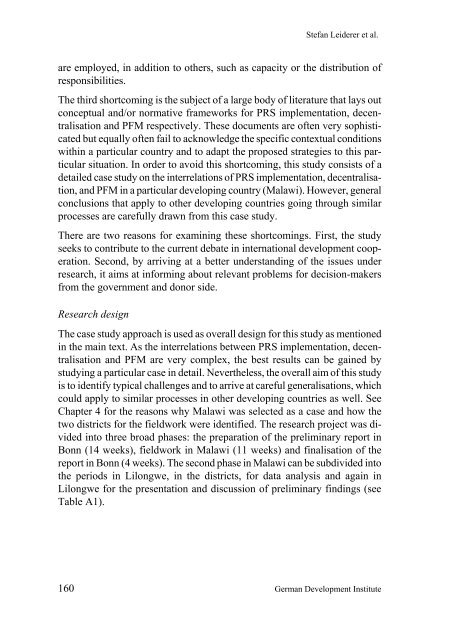Public Financial Management for PRSP - Deutsches Institut für ...
Public Financial Management for PRSP - Deutsches Institut für ...
Public Financial Management for PRSP - Deutsches Institut für ...
Create successful ePaper yourself
Turn your PDF publications into a flip-book with our unique Google optimized e-Paper software.
Stefan Leiderer et al.<br />
are employed, in addition to others, such as capacity or the distribution of<br />
responsibilities.<br />
The third shortcoming is the subject of a large body of literature that lays out<br />
conceptual and/or normative frameworks <strong>for</strong> PRS implementation, decentralisation<br />
and PFM respectively. These documents are often very sophisticated<br />
but equally often fail to acknowledge the specific contextual conditions<br />
within a particular country and to adapt the proposed strategies to this particular<br />
situation. In order to avoid this shortcoming, this study consists of a<br />
detailed case study on the interrelations of PRS implementation, decentralisation,<br />
and PFM in a particular developing country (Malawi). However, general<br />
conclusions that apply to other developing countries going through similar<br />
processes are carefully drawn from this case study.<br />
There are two reasons <strong>for</strong> examining these shortcomings. First, the study<br />
seeks to contribute to the current debate in international development cooperation.<br />
Second, by arriving at a better understanding of the issues under<br />
research, it aims at in<strong>for</strong>ming about relevant problems <strong>for</strong> decision-makers<br />
from the government and donor side.<br />
Research design<br />
The case study approach is used as overall design <strong>for</strong> this study as mentioned<br />
in the main text. As the interrelations between PRS implementation, decentralisation<br />
and PFM are very complex, the best results can be gained by<br />
studying a particular case in detail. Nevertheless, the overall aim of this study<br />
is to identify typical challenges and to arrive at careful generalisations, which<br />
could apply to similar processes in other developing countries as well. See<br />
Chapter 4 <strong>for</strong> the reasons why Malawi was selected as a case and how the<br />
two districts <strong>for</strong> the fieldwork were identified. The research project was divided<br />
into three broad phases: the preparation of the preliminary report in<br />
Bonn (14 weeks), fieldwork in Malawi (11 weeks) and finalisation of the<br />
report in Bonn (4 weeks). The second phase in Malawi can be subdivided into<br />
the periods in Lilongwe, in the districts, <strong>for</strong> data analysis and again in<br />
Lilongwe <strong>for</strong> the presentation and discussion of preliminary findings (see<br />
Table A1).<br />
160 German Development <strong>Institut</strong>e
















